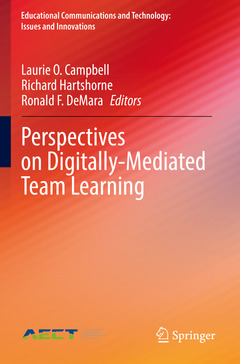Perspectives on Digitally-Mediated Team Learning, 1st ed. 2021 Educational Communications and Technology: Issues and Innovations Series

The purpose of the book includes expanding the learning science research base regarding how learning principles and strategies, including structured, collaborative, active, contextual, and engaging instructional settings, can support foundational STEM instruction and improve student interest and achievement. The chapters are classified into three categories: (a) empirical studies exploring the manner in which technology-enabled pedagogical principles and practices facilitate student interest in STEM courses, (b) exploration of logistical factors associated with revisioning STEM education and (c) theoretical underpinnings and literature review of digitally-mediated team learning.
The book showcases full-length manuscripts advancing transformative approaches for technology-enhanced team learning within STEM disciplines. Contributions have been sought from interdisciplinary researchers, developers, and educators who engage in the research, development, and practice of adaptable digital environments for highly-effective, rewarding, and scalable team-based and collaborative learning. These include such topics as real-time tools for teams in classroom settings; learning analytics; effective technology-enabled pedagogies; and technology-enabled, collaborative, pedagogical approaches to broaden participation in STEM disciplines.
Promising approaches and technologies to advance digitally-mediated team and collaborative learning are explored including learning analytics to form effective learning teams. Further, innovative cyber-assisted observation approaches for diagnostic/assessment observation and interaction with student teams, educational data mining of large volumes of collected data, and leveraging.
The book will be of interest to Higher Education Faculty in STEM, Learning Scientist, and K-12 educators and learning coaches.
Part I. Pedagogical Perspectives in Digitally-Mediated Team Learning.- Chapter 1. Aligning Teacher Facilitation Tools with Pedagogies in a Real-Time Environment for Mathematics Team Learning.- Chapter 2. Cultivating and Leveraging Continuous Accountability.- Chapter 3. Team Learning in a Technology-Driven Era.- Chapter 4. The Foundations of Collaborative Programming by Elementary-aged Children.- Part II. Tools for Facilitating Digitally-Mediated Team Learning.- Chapter 5. Using Extended Reality to Promote Team Learning.- Chapter 6. All-in-One Team-Based Learning (TBL) Technology: Profiling the www.intedashboard.com Technology Platform.- Chapter 7. Digitally-Mediated Tools for Facilitating High-Quality Team-based Programming Projects.- Part III. Analytics and Social Perspectives of Digitally-Mediated Team Learning.- Chapter 8. Designing Analytics to Support Team Learning.- Chapter 9. Building Rapport and Trust in Collaborative, Team-Based Online Learning Communities.- Chapter 10. Social Presence in WhatsApp as a social space for collaborative teacher development in Brazil.- Chapter 11. Technology-Enabled Team Learning Environments.
Ronald F. DeMara is a Pegasus Professor in the Department of Electrical and Computer Engineering at UCF where he has been a faculty member since 1993. His educational research interests focus on classroom instructional technologies and the digitization of STEM assessments. He was Principal Investigator of the NSF Workshop on Digitally-Mediated Team Learning held in 2019. He has created a series of faculty development courses on Assessment Digitization for engineering curricula and on workshops on Virtualized Active Learning. He has completed over 300 tec
Includes contributions from leading experts in the field
Provides an overview of related-tools to deploy DMTL in STEM classrooms
Addresses the promising practices related to DMTL pedagogy, analytics and assessment, and inclusivity of minoritized identities
Date de parution : 11-2022
Ouvrage de 220 p.
15.5x23.5 cm
Date de parution : 11-2021
Ouvrage de 220 p.
15.5x23.5 cm
Thème de Perspectives on Digitally-Mediated Team Learning :
Mots-clés :
Digitally Mediated Team Learning (DMTL); Inclusivity in STEM; STEM pedagogy [higher education or K-12]; Computer Supported Collaborative Learning; Cyberlearning and National Science Foundation; Tools for Team Learning; Machine Learning and Team Development; Learning Analytics and Collaborative Learning


